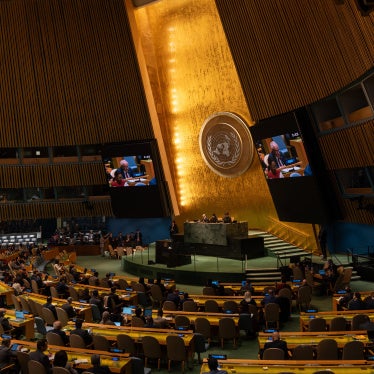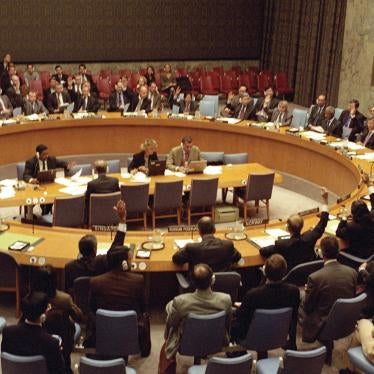Call for candidates for the mandate of the UN Special Rapporteur on the promotion and protection of human rights and fundamental freedoms while countering terrorism
In June 2011 at the 17th session of the United Nations Human Rights Council, the President of the Council is to appoint an independent human rights expert to serve as the next Special Rapporteur on the promotion and protection of human rights and fundamental freedoms while countering terrorism.
The following checklist is intended as an interpretive aid for the requirements set out in Human Rights Council resolution 5/1 and decision 6/102.
Amnesty International, the Association for the Prevention of Torture, Human Rights Watch, International Commission of Jurists, and the World Organisation Against Torture call on Governments, NGOs and others, including relevant professional networks, to use this checklist to identify eligible candidates for consideration for the upcoming vacancy for the Special Rapporteur on the promotion and protection of human rights and fundamental freedoms while countering terrorism.
Our organizations urge Governments to call publicly for candidates, e.g. through media advertisement, and consult civil society nationally before nominating candidates.
NGOs and others wishing to nominate candidates should, after checking with the person(s) concerned, send the names of eligible candidates to the Office of the High Commissioner for Human Rights (OHCHR) by Monday 14 March 2011 for inclusion in the list used as a basis for the appointment. Further information on vacancies for Special Procedures mandate-holders to be filled in June 2011 can be found here or by going to the Special Procedures extranet via the Human Rights Council extranet, linked from OHCHR website (http://www.ohchr/org).
While the organisations proposing these criteria consider commitment to universal human rights, relevant experience and competence, and personal integrity to be obligatory requirements for any individual to become an eligible candidate for this mandate, the organizations do not consider that a mandate holder must meet each and every specification in the checklists below. However, the strongest candidates should meet a substantial number of them. These checklists are not intended to be exhaustive.
Prospective mandate holders should be aware that this is a voluntary, unpaid role. Reasonable expenses for mandate related work will be paid, but no salary is available. It will require a substantial time commitment from the individual, including readiness to travel and respond to urgent situations, as explained in the checklist.
Checklist for selection of candidates for the mandate of UN Special Rapporteur on the promotion and protection of human rights and fundamental freedoms while countering terrorism
Proposed candidates for the mandate should be put forward on the basis of technical, professional and other requirements.
Human Rights Council (HRC) resolution 5/1 sets general criteria that are of ‘paramount importance while nominating, selecting and appointing mandate-holders: (a) expertise; (b) experience in the field of the mandate; (c) independence; (d) impartiality; (e) personal integrity; and (f) objectivity.'
HRC decision 6/102 establishes four technical and objective requirements (qualifications, relevant expertise, established competence and flexibility/readiness and availability of time) to be considered in the selection of Special Procedures mandate-holders.
Appointment should always be based on these criteria and objective requirements.
The following checklist is intended as an interpretive aid for those requirements:
1. Qualifications (and skills): relevant educational qualifications and equivalent professional experience in the field of human rights; good communication skills in two of the official working languages of the United Nations.
Checklist:
- A post-graduate university degree or equivalent in law with a discipline directly related to the mandate, preferably with a substantial focus on international human rights law, international humanitarian law and international refugee law;
- Academic publications or other published material (articles, studies, reports, research papers or any similar written material demonstrating in-depth knowledge) addressing issues relevant to the mandate, from a human rights perspective;
- Excellent oral and written communication skills in at least two of the UN working languages (English, French and Spanish - knowledge of other widely-used or official UN languages, such as Arabic, Chinese or Russian, would also be an asset);
- Extensive experience in public speaking (for example in expert seminars) and also in communicating with governments, the media and other relevant stakeholders.
2. Relevant expertise: knowledge of international human rights instruments and standards; knowledge of institutional mandates related to the United Nations or other international or regional organisations' work in the area of human rights; proven work experience in the field of human rights.
Checklist:
- Extensive knowledge of international human rights law and standards, international humanitarian law, and international refugee law;
- At least ten years of progressively responsible work experience in the field of human rights, including in conducting or monitoring human rights investigations, in particular involving: (1) measures taken in the name of countering terrorism or national security; and (2) the treatment of victims of terrorism, victims of indiscriminate attacks by other armed groups, and victims of attacks that target civilians;
- Excellent knowledge of the international and regional legal frameworks and case law relevant to the promotion and protection of human rights and fundamental freedoms while countering terrorism such as the absolute and non-derogable prohibition of torture and other cruel, inhuman or degrading treatment or punishment; the right to life; the prohibition against enforced disappearances; the prohibition against extrajudicial, summary or arbitrary executions; the prohibition against arbitrary detention; safeguards and restrictions related to imposition of the death penalty; international standards on the use of force; fair trial rights; prosecution and sanctioning of perpetrators of serious crimes, including those related to national security; the right to remedies and reparations, including compensation and rehabilitation of victims; and the bringing to justice of perpetrators of human rights violations; as well as the right to privacy and principle of non-discrimination;
- Excellent knowledge of institutional mandates of the United Nations or other international or regional organisations in the area of human rights, international humanitarian law, and international refugee law;
- Excellent knowledge of the safeguards and restrictions related to the imposition of non-criminal/administrative measures taken in the name of countering terrorism or protecting national security;
- Good knowledge of international and regional frameworks for the countering of terrorism and an understanding of key documentation such as the UN Global Counter-Terrorism Strategy.
3. Established competence: nationally, regionally or internationally recognised competence related to human rights.
Checklist:
- Excellent knowledge and expertise on human rights compliant criminal justice responses to terrorism, the administration of justice, and the rule of law in the context of national security and serious crimes such as terrorist acts;
- Extensive experience in critically analysing information and data, in order to be able to review individual cases as well as identify trends and make effective recommendations and in assessing national security legislation for compliance with international human rights standards;
- Knowledge of human rights-based principles and methodologies for visiting places of detention and interviewing individuals, and preferably also experience of visiting and interviewing individuals in challenging circumstances in various countries;
- The ability to conduct both academic and field research required in carrying out fact-finding missions;
- Experience in interacting with the treatment of victims of terrorism, victims of indiscriminate attacks by other armed groups, and victims of attacks that target civilians;
- Experience in interacting with individuals whose human rights and fundamental freedoms may have been violated as a result of measures taken in the name of countering terrorism or protecting national security;
- Experience in engaging on the impact on human rights and issues of accountability with authorities responsible for setting national security laws and policies;
- Experience in working with authorities responsible for persons deprived of their liberty (including prison guards, police, medical personnel, and other officials), especially in the context of measures taken in the name of countering terrorism or protecting national security;
- Experience in the development and delivery of human rights and rule of law assistance, including the training of law enforcement and legal professionals working to counter terrorism and strategies to strengthen rule of law institutions and their compliance with human rights law;
- Awareness of the particular vulnerabilities of specific groups, including ethnic and religious minorities, non-nationals, members of political opposition groups, and others who have faced a heightened risk of human rights violations as a result of measures taken in the name of countering terrorism or protecting national security;
- Ability to critically engage with UN stakeholders on counter-terrorism, including in the context of the UN Global Strategy on Counter-Terrorism, the Counter-Terrorism Implementation Task Force and the UN Security Council Counter-Terrorism Committee and its Executive Directorate;
- Commitment to working closely with a range of stakeholders, including NGOs.
Experience in handling cases relating to human rights violations committed in the name of countering terrorism or national security before judicial and quasi-judicial bodies would also be an asset.
4. Flexibility/readiness and availability of time to perform effectively the functions of the mandate and to respond to its requirements, including conducting visits, preparing reports and attending Human Rights Council sessions and General Assembly sessions.
Checklist:
- Willingness and ability to conduct in-country investigations, in all regions of the world, into government policies, legislation and practices in the context of measures to counter terrorism that result in human rights violations, as well as practices that fail to respect the rights of victims of terrorism, victims of indiscriminate attacks by other armed groups, and victims of attacks that target civilians;
- A demonstrated commitment to human rights law, standards and values, including an understanding of the potential long-term human rights implications of emergency and national security laws and policies to counter terrorism;
- A commitment to uphold the integrity, independence and impartiality of the Special Rapporteur's mandate;
- Willingness and ability to devote a substantial proportion of working hours to fulfilling the mandate, which includes undertaking two to three country missions per year, preparing and presenting reports to the Human Rights Council and the General Assembly (including annual and country mission reports), and attending seminars and other UN meetings;
- Willingness and ability to act urgently when cases or situations so require.







